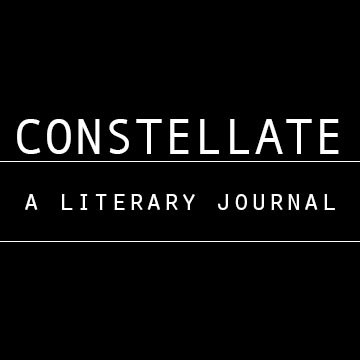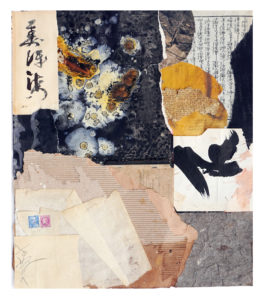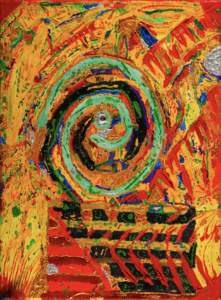(A Recollection of the first days of Covid, March 2020)
In the woods outside my home, seven deer roamed amid the downed timber and burgeoning spring growth on the forest floor. Daffodils, blown by some errant breeze, grew in clumps among the thick carpet of dried, brown leaves. From the heavy winds that winter, two tall trees had cracked and rested their falls against neighboring lindens and oaks, temporary support before their heavy trunks succumbed to rot and gravity. Above them, a Cooper’s hawk whistled its lone, high note as it circled the sky and rode the breeze. Closer to where I stood, near the tumbling wall of flagstones used to frame the end of my yard (and to dissuade the ivy and rampant myrtle from creeping into the grass) a wren flitted among a cluster of rotting stumps and twigs, and chirps.
An early spring day like so many early spring days.
An early spring day unlike any other spring day in my life.
For the previous few weeks my life and the lives of so many others before this day had endured a cruel hit, not by a meteor or bombing, or invasion of many-celled monsters the likes of which we savored nightly on TV during the week before Halloween. No, these mutated monsters and aliens from other planets, and ghostly remains of spirits and souls, grabbed our attention for two hours that Halloween week before disappearing like mist when the film ended. In the morning we arose to a new day, rooted in the familiar and able to predict our next moves.
This hit came in the form of a virus, the smallest of all microbes, which are microorganisms too small to be seen by the naked eye. This particular microbe, the coronavirus, resembles a ball with spikes (proteins) protruding from its surface which attach the virus to a host cell. It reminds me of the scented Christmas oranges, which my mother made when I was little by sticking whole, spiked cloves into unpeeled oranges to hang in clusters. Unlike the sweet, citric holiday smell that lingered for days, evoking memories of family gatherings and good tidings, the spiked orb of the virus did, and will, evoke memories of social distancing, family separation, economic turmoil, death and a lingering fear that even with a vaccine, it might pop its little head up willy-nilly with a mutated character.
During the following weeks of social distancing, limited outside activity, and recommended isolation, I defended my MFA thesis via Skype, conversed with sons and grandsons remotely, seasoned my paschal lamb for me and my husband without family, and missed what would have been two normal birthday gatherings. My 94-year old mother-in-law remained isolated in a nursing facility with limited staff and no hope of visitors. I picked up her dirty laundry, wrapped in a plastic bag outside the building where an aide placed it for easy access. I saw the nurse womanning the reception desk wave behind bolted glass doors, mask in place. When I returned home, I disinfected my steering wheel and door handle, cleansed the plastic bag holding her clothes, and used hot water for her laundry. Then I scrubbed my hands thoroughly for the CDC recommended 20 seconds before toweling off.
These interruptions in daily life were a nuisance, but bearable. And scary. What if that accessory scarf I used to cover my mouth and nose when I picked up vegetables at the grocery store let the little bug linger on its surface, and I didn’t remember if I fingered it? What about the newspaper and its plastic bag I cleaned after bringing it into the house? Someone had touched the paper itself to place it in the bag; how was I supposed to de-microbe a newspaper?
I tried to live normally, my days with purpose and grace and a schedule of unnecessary and necessary to-do’s that kept me focused and on track for graduation, and to maintain my mental and emotional stability. Sometimes the what-ifs derailed my forced equanimity. What if the people I love became symptomatic too late and died? What if there is no cure? Would my mother-in-law die in a small room, in her wheelchair, wondering how, before the big sleep, she ended up alone? What if Covid-19 returned next year, morphed and reenergized into a nastier, meaner little bug?
These questions were not new or unique, flailing in the universe with my name on them. I listened to talk radio and heard the fear in the voices of hosts, doctors, audience members who shared their angst. I had brooded about epidemics in other eras and read dystopic and apocalyptic literature where the world comes to a shattering halt. I remembered participating in nuclear war drills in Pittsburgh, running home at the age of seven and having been warned that if a real nuclear crisis occurred, the elementary kids within my school had to be home within so many minutes to be safe, as if the microscopic fallout wouldn’t permeate the cracks and finite apertures of our hastily built, post WWII houses. I used to worry my sisters and brothers might not make it home on time. In this time of Covid, I worried my siblings, my children and husband might die.
I called my sister Diana to see how she was faring. Did she still have her job? Did she have enough money? She doesn’t drive, walks and takes the bus everywhere, and lives in a congested, old-home community five minutes from Pittsburgh proper. She told me that the hardest ‘new normal’ was not having options for where she could go, who she could see, what she could do. I was reminded of a chapter in the children’s book, A Wrinkle in Time, where Meg Murray witnesses a young boy’s fear of reprisal for having dropped a red ball out of unison in a government-controlled society. Living with strictures that limited the who, what, where and when of our societal lives in order to starve to death this lethal, spiked little Christmas orange seemed like an okay thing in the face of it all. Yes?
It was still a hard normal to buy.
I needed vegetables for a salad the first week Ohio shut down schools and non-essential businesses. Could I do without fresh vegetables and avoid infected people? Yes, I answered. Should I compromise my immune system when I needed to be cognizant of eating good food so Covid didn’t latch onto me? No, I decided. In my drawer upstairs I found a plethora of scarves given to me as gifts over the years. I chose an opaque black, long scarf and circled it around my neck, where I could easily reach up and extend it over my nose and mouth. It matched my black shoes and long black sweater, and I decided protection and fashion sense might lessen how ridiculous I felt and looked as I glanced at the stranger in my bathroom mirror. Customers and cashiers might laugh, but at the time I hadn’t the luxury of an official face mask and had to make do.
I parked two spaces away from other cars. The sun was bright, the dreary heaviness of Cleveland’s wintry gray clouds moving north over Lake Erie. Several customers walked to their cars wearing real masks. My heart fell but I screwed my courage to the sticking post, determined that no matter how old-lady-making-do I might appear, I wouldn’t catch or spread the sinister disease. I straightened my back with purpose, humility, appreciation. I would make a fool of myself, if that is what I looked like.
Inside, I saw several tidy, Dr. Anthony Fauci-prescribed masks on customers and grocers. I also saw makeshift masks akin to mine in an array of colors, fabrics and patterns on women and men of all ages. Even with social distancing, the murmured “excuse me” muted under my scarf, and my own heightened awareness to stand six feet apart from other shoppers, I noticed how those I sought to avoid pivoted and darted right and left to avoid me. The initial awkward first step taken with a mask in public, I was not alone in confronting the new reality forced upon us by the covid virus.
I finished shopping and got into my car. After wiping off the steering wheel and door handles, I used hand sanitizer on my gloved hands. At home, determined to decimate all avenues of infection, I cleaned vegetables and fruit (each carrot, each strawberry run under soapy, hot water, each banana peel sparkling yellow) before hanging my makeshift mask on a peg to air out. Before I sat down to write, I moisturized my dry hands to keep the skin from splitting and creating a doorway for the virus. After several days, no matter moisturizing, my fingers looked like wizened twigs.
I looked outside.
In the bird feeder beyond my front door, an array of returning and all-season birds jostled for position on the rungs of my tall, multi-perch bird feeder. A goldfinch couple flitted from dried hydrangea stalks to the feeder, butting out the house finches and chickadees. On my maple tree, its branches hanging low and near the feeder, a tufted titmouse chirped its sweet song while a blue jay squawked and dove toward fallen seeds around the feeder. The simple, graceful movements of the mourning doves belied the fact that they are pigeons after all, pecking and bobbing their short necks among the leftovers.
Across the street, my neighbor’s daughter parked her car and placed a cardboard box outside her mother’s front steps. The daughter stood on the sidewalk, cell phone to ear, staring at her mother’s front door until her mother opened it. The daughter waved, called “I love you” and returned to her car. Her mother waved, blew a kiss, and carried the package inside. Near my feet, Atticus Finch meowed and concentrated his Siamese blue eyes on me. He had seen the riot of colors and bird play outside and anxiously desired to be a part of it all.
I am reminded of Robert Frost’s poem, The Need of Being Versed in Country Things, a poem about a devastating fire that destroys a family (substitute humanity here) and the uncaring, neutral stance of nature in the face of human disaster. The deer have returned to my back yard this spring, the ivy creeps through my flagstones, and the birds fight for dominance on my feeder. My what-ifs, oh-no’s and reevaluations of the new normal weren’t noticed or considered by creatures other than people last year. For the natural world, the days ahead were like any other day in early spring. It is the same this spring.
This past year my mother-in-law died alone in her quarantined nursing home. I lost two friends, and siblings and friends caught Covid. Happily, they live. I am scheduled for my vaccine, and maybe this spring will bring a reemergence of what was normal for people before Covid. For the deer and birds and creeping myrtle and ivy vying for purchase in my grass, it is simply the end of winter.
The Need of Being Versed in Country Things
BY ROBERT FROST
The house had gone to bring again
To the midnight sky a sunset glow.
Now the chimney was all of the house that stood,
Like a pistil after the petals go.
The barn opposed across the way,
That would have joined the house in flame
Had it been the will of the wind, was left
To bear forsaken the place’s name.
No more it opened with all one end
For teams that came by the stony road
To drum on the floor with scurrying hoofs
And brush the mow with the summer load.
The birds that came to it through the air
At broken windows flew out and in,
Their murmur more like the sigh we sigh
From too much dwelling on what has been.
Yet for them the lilac renewed its leaf,
And the aged elm, though touched with fire;
And the dry pump flung up an awkward arm;
And the fence post carried a strand of wire.
For them there was really nothing sad.
But though they rejoiced in the nest they kept,
One had to be versed in country things
Not to believe the phoebes wept.
© Pamela Cottam
Pamela Cottam is an emerging author with an MFA in Creative Writing. Pamela has written a mystery novel, children’s stories and adult short fiction. Her writing has been published in Across the Margin, Better than Starbucks2 and Active Muse. She received Honorable mention in the 2019 Friends of Chautauqua Summer creative writing contest, which she attended on a scholarship.



